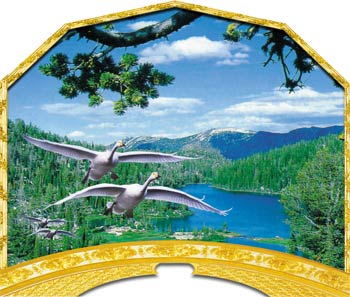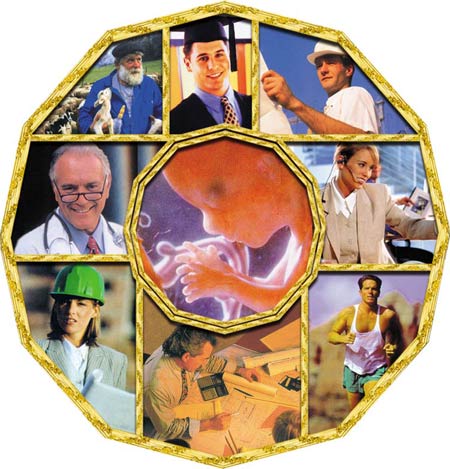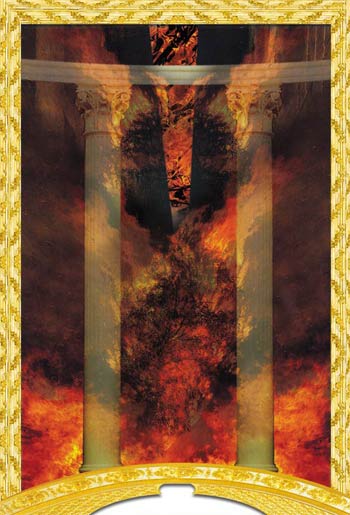… and that Day Hell is produced, that Day man will remember; but how will the remembrance help him? He will say, 'Oh! If only I had prepared in advance for this life of mine!' That Day no one will punish as He punishes and no one will shackle as He shackles.
(Surat al-Fajr: 23-26)
The Afterlife According To The Idea of Karma
Religions of which karma is a part have no belief in the hereafter. That is yet another superstitious aspect of karmic philosophy. The truth is that every human being begins the infinite life of the hereafter when he dies.
There is no belief in an afterlife in religions that espouse the concept of reincarnation, except sometimes as an intermediate stage between lives in this world. As we have explained in the preceding chapters, this mistaken idea holds that people return to the world after each death, and that this process of transformation is continuous.
According to decadent Hinduism, every time people are reborn, they are born into one of the different castes according to what good or evil they did in their previous lives. It is well known that the caste system is still prevalent in Indian society; whatever people may do in this world, they cannot change their caste. If you are born as an untouchable, you will inevitably die as an untouchable; if you are born a worker, you will die a worker. It is believed that it is what people have done in their previous lives that determines into what caste they will be born. Therefore, someone who is an untouchable in this life will, according to the idea of karma, be reborn into a higher caste in their next life if their actions are good.
 Again, according to this erroneous belief, if one has "good karma", he will be born into a higher caste each time he comes into this world, and finally he will be born into the highest caste as a Brahmin – priest. It is believed that if one does good deeds during his life as a Brahmin, he will not come back to this world again. For someone of this kind, the "wheel of life" is completed and he has "attained Nirvana".
Again, according to this erroneous belief, if one has "good karma", he will be born into a higher caste each time he comes into this world, and finally he will be born into the highest caste as a Brahmin – priest. It is believed that if one does good deeds during his life as a Brahmin, he will not come back to this world again. For someone of this kind, the "wheel of life" is completed and he has "attained Nirvana".
According to this belief, "attaining Nirvana" means that one has thrown off all worldly desires and returned to the soul of Brahman who is described as the "Soul of the World", with whom one is united. In Indian religions, this is thought to be the greatest happiness a soul can achieve. Thus, according to this incorrect belief, even though a person may do good every time he is born into this world, this will never result in his having an afterlife; he will return to and become united with the soul of Brahman.3
In some Buddhist sources, we are given the following information about life after death:
Whether one is reborn in Heaven or in one of the various levels of Hell, the forms of existence in these places are transitory, as they are on earth, and are not eternal. As in Hinduism, the period of time during which the individual remains in these places depends on the amount of good and evil they have done while on earth. When the proscribed time has been completed, they will return to earth again. Heaven and Hell are no more than temporary states of existence in which the acts of the individual while on earth receive their reward.4
Thus we see that in karma concept there is a belief of a kind in a Heaven and Hell in which people receive the reward of their actions. However, because this belief is not derived from a religion of truth, it contains many inconsistencies and logical fallacies. First of all, it is claimed that Heaven and Hell are transitory, not eternal—this is not what true religions tell us.
The most illogical aspect of this idea is the belief that this whole system works by itself. In other words, the existence of a Creator Who created the life of this world, Who created the Garden and the Fire, and Who rewards or punishes people for their actions, is denied. This is an extremely illogical and totally unacceptable proposition. In the absence of a creative power that governs justly, a supreme power capable of creating Heaven and Hell, any claim that people will go to Heaven or to Hell is unacceptable to our intelligence and our conscience.
Moreover, apart from these beliefs, the concept of karma provides no explanation whatsoever as to how Heaven and Hell came into being without a Creator. These claims are merely erroneous beliefs, maintained as a tradition and as a superstition.
The afterlife as described in the Qur'an
 People are preoccupied with a great many activities in the life of this world. They go to school, work, get married, look after their families, travel, read, write… However, people who devote themselves to that sort of activity and forget that they will one day die actually do themselves great harm, as human life is not restricted to this world. Compared to the eternal life of the hereafter, the life of this world is no more than the blink of an eye. The important thing is for an individual to spend his life in an effort to please Allah, to Whom he will have to give account in the hereafter. Someone who becomes caught up in the idea of karma and other similar superstitious beliefs and loses sight of the hereafter may one day suffer terrible surprise and regret when he suddenly finds himself at the Day of Judgement. |
As we have seen above, in religions that accept the idea of karma there is either no belief in an afterlife, or there is mention of the next world as a place where one stays temporarily. Whereas, Allah tells us in the Qur'an that when people have lived on earth for a short time they will stay in their "real home", the next world, for ever. According to the Qur'an's teaching, it is this world that is transitory. Everyone, when they have lived in this world for some 50 or 60 years on average, will receive their reward in Heaven or in Hell for all they have done during their time on earth. This is explained in the Qur'an as follows:
The life of this world is nothing but a game and a diversion. The abode of the hereafter—that is truly Life if they only knew. (Surat al-Ankabut: 64)
The life of this world is nothing but a game and a diversion. The hereafter is better for those who do their duty. So will you not use your intellect? (Surat al-An'am: 32)
Belief in the afterlife is one of the basic tenets of Islam. Therefore it is not possible for a Muslim to accept the validity of any belief that denies the existence of an afterlife, or to be guided by such a belief. Those who adopt a superstitious belief of this kind on the basis of hearsay, as an affectation or to follow the latest fad, need to keep this in mind. Allah describes the fate of those who deny the existence of the next world in the following words:
As for those who denied Our Signs and the encounter of the hereafter, their actions will come to nothing. Will they be repaid except for what they did? (Surat al-Araf: 147)
As we see in this verse, the actions of those who reject Allah's words and deny the existence of the next world will not receive a pleasant reward. Even though such people's actions are good, if they are not done in order to win Allah's blessing and His mercy and to attain the Garden, but rather in order to have a better life in the next incarnation, they will not find favour with Allah, unless Allah wishes that it should be so.
Life in the Garden or in the Fire will go on for ever
Contrary to what those who believe in karma say, the Garden and the Fire are not places in which we stay temporarily. Both will go on for ever. Also, just as those who go to the Garden will never leave it, so will some of those who go to the Fire stay there for ever. There is a superstitious belief not only among those who accept the idea of karma but also among the general public that Hell is only temporary, and that when people have lived through the tortures of Hell and so been punished, they will go to Heaven.5 Allah explains this in the following words:
They say, "The Fire will only touch us for a number of days". Say, "Have you made a contract with Allah—then Allah will not break His contract—or are you rather saying about Allah what you do not know?" No indeed! Those who accumulate bad actions and are surrounded by their mistakes, such people are the Companions of the Fire, remaining in it timelessly, for ever; whereas those who believe and do right actions, such people are the Companions of the Garden, remaining in it timelessly, for ever. (Surat al-Baqara: 80-82) 6
Those who fear that death will bring a cessation of existence will cry out for destruction when they are in Hell
 |
As we have already stated, one of the most important reasons why some people believe in reincarnation is that they are afraid of ceasing to exist when they die. Since they are frightened by the thought of this, people who are unbelievers or have very little religious faith either avoid thinking about death altogether or they try to console themselves by believing in superstitions such as reincarnation.
However, people do not cease to exist when they die. It is only our bodies that die. The spirit will live forever. However, this new life will be in the next world, not (as the reincarnation idea would have us believe) in this one. Everyone will be rewarded for what they have done during their earthly life; their reward will be either a life of happiness and peace in the Garden, in which there are infinite blessings and countless good things, or a life in the fires of Hell, where there is unbearable suffering and pain. The reward that those who deny Allah will receive is the eternal torture of the Fire; they will wish a thousand times over that they could die and cease to exist. Nevertheless, they will receive the true and just reward for having denied Allah during their time on earth. Allah describes the condition of the inhabitants of the Fire in the following verses:
But as for him who is given his Book behind his back, he will cry out for destruction but will be roasted in a Searing Blaze. He used to be joyful in his family. He thought that he was never going to return. (Surat al-Inshiqaq: 10-14)
When they are flung into a narrow place in it, shackled together in chains, they will cry out there for destruction. "Do not cry out today for just one destruction, cry out for many destructions!" (Surat al-Furqan: 13-14)
The tortures of Hell are so violent and so painful that those who fear death and an end to their existence, and turn their faces away from Allah's religion, seeking consolation in superstitious beliefs, and those who deny the existence of Allah and the next world, will instead wish for that very end to their existence in preference to the tortures of the Fire.
Everyone who has learnt from the Qur'an of the existence of the next world, of the eternal agonies of the Fire and of the extraordinary beauty of the eternal life in the Garden should consider these things carefully and sincerely. Only someone lacking in intelligence and lacking a conscience would admit the possibility that the pains of Hell really existed and still refuse to reflect on the implications. Faced with the possibility of such a terrible thing as living in the Fire for ever, it would be the height of stupidity to cast this awareness aside in one's determination to "get the best out of life" during the short time we have on Earth.
Instead, we should make a serious effort to avoid bringing this torture upon ourselves, and we should meticulously follow the teachings that Allah gives us in the Qur'an, and make the best possible use of the time given to us in this world in view of the reality of the afterlife. We will understand everything fully only at the very moment when death comes to us. This is what the Qur'an tells us about what is said at that moment by those who have tried to avoid thinking about these things because of their fear of death:
The throes of death come revealing the truth. That is what you were trying to evade! The Trumpet will be blown. That is the Day of the Threat. Every self will come together with a driver and a witness: "You were heedless of this so We have stripped you of your covering and today your sight is sharp". His inseparable comrade will say, "This is what I have ready for you". Hurl into Hell every obdurate disbeliever, impeder of good, doubt-causing aggressor, who set up another god together with Allah. Hurl him into the terrible punishment. (Surah Qaf: 19-26)
Footnotes
3-Buyuk Dinler ve Mezhepler Ansiklopedisi (Big Religions and Sects Encyclopedia), 1964, Istanbul, p. 524- Dr. Ali Ihsan Yitik, Hint Kokenli Dinlerde Karma Inancinin Tenasuh Inanciyla Iliskisi (The Relation of the Idea of Karma in Indian Religions with the Idea of Reincarnation) , pp. 130-131
5- Editor’s note: This is only true, however, as we mention, for those of the believers whom Allah punishes for major wrong actions short of associating partners with Allah by admitting them to the Fire. The disbelievers who reject Allah and His signs and His Messengers will stay in the Fire forever as a result of their actions.
6- Editor’s note: This verse was revealed about the Jews claiming that the Fire would only touch them for a number of days, but this was false in their case because the wrong action for which they thought they would be forgiven was their rejection of Allah’s signs and His Messengers including their murdering some of the Messengers and Prophets, and finally their rejection of ‘Isa, peace be upon him, and Muhammad, may Allah bless him and grant him peace. For such open disbelief there is no emerging from the Fire, unless the person turns to Allah in tawbah before his death. As for believers who do major wrong actions, Allah will either forgive them totally or He may punish them for a period of time in the Fire and then bring them out of the Fire to the Garden by His mercy and by the intercession of His Messenger, may Allah bless him and grant him peace, and the intercession of the right-acting among the Muslims.
- Introduction
- What is The Concept of "Karma"?
- Reincarnation According To The Idea of Karma
- The Afterlife According To The Idea of Karma
- The Life of This World According To The Idea of Karma
- Concepts of Fate in The Karma Belief System and in The Qur'an
- True Peace of Mind and Contentment
- Allah is The Source of Real Justice
- The Qur'an: Allah's Most Recent Revelation
- Conclusion
- Appendix: The Miracles of The Qur'an
